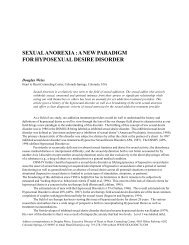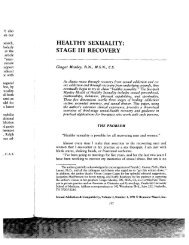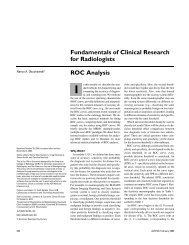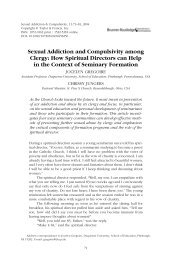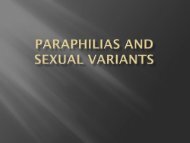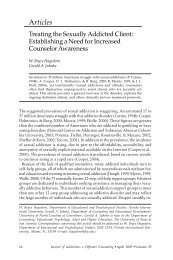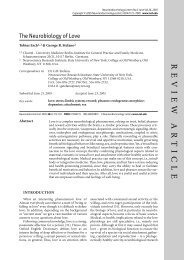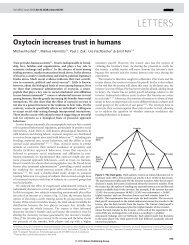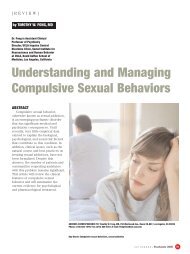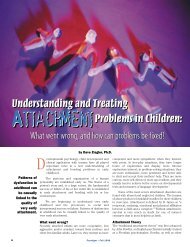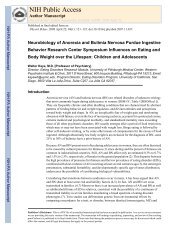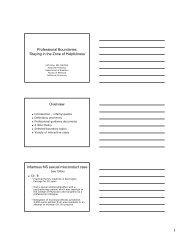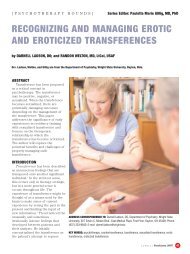Coverage and Liability Issues in Sexual Misconduct Claims
Coverage and Liability Issues in Sexual Misconduct Claims
Coverage and Liability Issues in Sexual Misconduct Claims
- No tags were found...
Create successful ePaper yourself
Turn your PDF publications into a flip-book with our unique Google optimized e-Paper software.
MASSACHUSETTSStatute of LimitationsMassachusetts has a three-year limitation period for tort actions.Mass. Gen. Laws ch. 260 § 2A.There is a discovery rule whereby actions for sexual abuse of am<strong>in</strong>or shall be commenced with<strong>in</strong> three years from the acts allegedto have caused an <strong>in</strong>jury or condition or with<strong>in</strong> three years of the timethe victim discovered or reasonably should have discovered that anemotional or psychological <strong>in</strong>jury or condition was caused by said act,whichever period expires later. Id. at 260 §4C. In order to survive amotion for summary judgment a claimant must show that the natureof the abuse was such that it would cause an objectively reasonableperson to fail to recognize the causal connection between it <strong>and</strong> the<strong>in</strong>juries that it caused. Doe v. Creighton, 786 N.E.2d 1211 (Mass.2003) (Found victim’s delay <strong>in</strong> fil<strong>in</strong>g suit for sexual abuse was notobjectively reasonable <strong>and</strong> therefore statute of limitations not tolledwhere victim was 16 years old at the time of abuse <strong>and</strong> the <strong>in</strong>jurieswere immediate <strong>and</strong> obvious). The discovery rule applies to tortactions aga<strong>in</strong>st perpetrators <strong>and</strong> non-perpetrators of the abuse <strong>and</strong>one need not apprehend the full extent or nature of an <strong>in</strong>jury <strong>in</strong> orderfor a cause of action to accrue. See Ph<strong>in</strong>ney v. Morgan, 654 N.E.2d77 (Mass. App. Ct. 1995); Flanagan v. Grant, 79 F.3d 1 (1st Cir. 1996); See also Ross v. Garabedian, 742 N.E.2d 1046 (Mass. 2001) (Foundsufficient evidence to defeat motion for summary judgment on statuteof limitations issue where it was unclear whether pla<strong>in</strong>tiff perceived acausal connection between a defendant’s misconduct <strong>and</strong> the allegedpsychological harm).Report<strong>in</strong>g LawsOtherMass. Gen .Laws Ann. Ch. 119 §51A et. seq.If a tort is committed <strong>in</strong> the course of any activity carried on toaccomplish directly the charitable purposes of a corporation, trust orassociation, then liability shall not exceed twenty thous<strong>and</strong> dollarsexclusive of <strong>in</strong>terest <strong>and</strong> costs. Mass. Ann. Laws ch. 231, § 85K.<strong>Sexual</strong> assault committed by an employee does not trigger vicariousliability of the employer. Jane Doe v. Purity Supreme, Inc., 422 Mass.563 (Mass. 1996); Worcester Ins. Co. v. Fells Acres Day Sch. Inc.,558 N.E.2d 958 (Mass. 1990); Timpson v. Transamerica Ins. Co., 669N.E.2d 1092 (Mass. App. Ct. 1996). However, an employer may beliable by reason of ratification of the employee’s <strong>in</strong>tentional torts. SeeGagne v. O’Donoghue, 1996 WL 1185145 (Mass. Super. Ct. Jun. 26,1996) (Found evidence to withst<strong>and</strong> a motion for summary judgmentwhereby diocese may have ratified sexual abuse committed by priestby fail<strong>in</strong>g to <strong>in</strong>vestigate <strong>and</strong> discipl<strong>in</strong>e).Clerics are not immune from liability for direct<strong>in</strong>g or permitt<strong>in</strong>g asubord<strong>in</strong>ate to do someth<strong>in</strong>g that would expose a third party to danger.Leary v. Geoghan, 2000 WL 1473579 (Mass. Super. Ct. Jun. 28,2000); Mendez v. Geoghan, 1999 WL 792202 (Mass. Super. Ct. Aug.2, 1999); Gagne v. O’Donoghue, 1996 WL 1185145 (Mass. Super.Ct. Jun. 26, 1996) (Negligent hir<strong>in</strong>g <strong>and</strong> supervision claims aga<strong>in</strong>streligious organization aris<strong>in</strong>g out of sexual molestation of children bypriest not barred by the First Amendment). Documents from priest’spersonnel file are not protected by the First Amendment or analogousprovisions of the Massachusetts Constitution. Soc’y of Jesus of NewEng. v. Commonwealth, 808 N.E.2d 272 (Mass. 2004), aff’d, 818N.E.2d 559 (Mass. 2004).– 31 –



